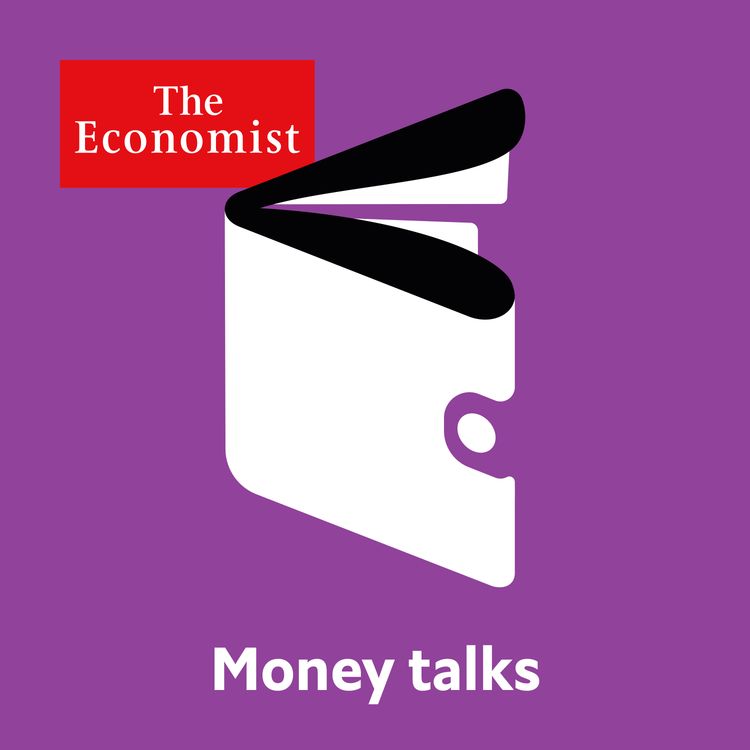Share

Money Talks from The Economist
Money talks: WeWorry
•
WeWork has scrapped plans for an initial public offering after its CEO stepped down amid claims of mismanagement. What does its implosion mean for investors and other young firms with similar ambitions? Greece's new government is preparing to announce its first draft budget. Will it be enough to re-energise the economy? Plus, a taste of Chinese fine wine. Patrick Lane hosts
More episodes
View all episodes

Sea change: the SEC under Trump 2.0
43:58|During Joe Biden's presidency, the Securities and Exchange Commission was chaired by Gary Gensler. Under his leadership, America’s most powerful market regulator became more aggressive, imposing new disclosure rules for cyber-security and climate risk, and pursuing litigation against the burgeoning crypto industry. After the re-election of Donald Trump, Mr Gensler resigned from the SEC. What followed was one of the biggest U-turns in the regulator’s history. We speak to Mark Uyeda, the man Mr Trump appointed acting SEC chair on 20 January for three months until Paul Atkins, Mr Gensler’s permanent replacement, could be sworn in. What are the SEC’s new priorities, now that Mr Trump is back in power?Hosts: Mike Bird and Ethan Wu. Guest: Mark Uyeda, commissioner and former acting chairman of the SEC.Transcripts of our podcasts are available via economist.com/podcasts.Listen to what matters most, from global politics and business to science and technology—subscribe to Economist Podcasts+.For more information about how to access Economist Podcasts+, please visit our FAQs page or watch our video explaining how to link your account.
Don’t discount stores: how Walmart caught up with Amazon
45:33|Two decades ago, Walmart was on top of the world. The business model of cheap prices and giant big-box stores, pioneered by founder Sam Walton, had delivered a market share that no other American retail chain could touch. Then e-commerce arrived in the shape of a formidable new competitor—Amazon. Yet despite being written off at the time by pundits and investors as a retail dinosaur, Walmart has quietly reinvented itself as a tech company. Now it’s fast closing the gap on Amazon, and its huge presence in the physical world may even give it the edge on its online rival.Hosts: Mike Bird and Ethan Wu. Guests: Avantika Chilkoti, The Economist’s global business writer; Dan Bartlett, Walmart’s Executive Vice President for Corporate Affairs; Suresh Kumar, Walmart’s Chief Technology Officer; and Simeon Gutman, retail analyst at Morgan Stanley.Transcripts of our podcasts are available via economist.com/podcasts.Listen to what matters most, from global politics and business to science and technology—subscribe to Economist Podcasts+.For more information about how to access Economist Podcasts+, please visit our FAQs page or watch our video explaining how to link your account.
Economic warfare: lessons from the US-China trade spat
44:57|America and China have agreed to a 90-day truce of their month-long trade war, but the economic uncertainty has not yet ended. Beyond tariffs, the spat had begun spilling over into other areas, with China imposing a ban on the export of critical minerals designed to hobble American industries. Could global supply chains and financial systems be weaponised in a similar way? If so, could such actions further fragment the global economy to everyone’s detriment? And what would stop economic warfare escalating into full-blown military conflicts?Hosts: Mike Bird and Ethan Wu. Guests: Edward Fishman of the Center on Global Energy Policy and Columbia University, and author of "Chokepoints: American Power in the Age of Economic Warfare"; and Dan Wang, research fellow at Stanford's Hoover History Lab and author of "Breakneck: China’s Quest to Engineer the Future".Transcripts of our podcasts are available via economist.com/podcasts.Listen to what matters most, from global politics and business to science and technology—subscribe to Economist Podcasts+.For more information about how to access Economist Podcasts+, please visit our FAQs page or watch our video explaining how to link your account.
Buck stops here: Kenneth Rogoff on the future of the US dollar
45:15|For the last 80 years, the US dollar has reigned supreme over global markets. It still accounts for more than half of all foreign trade invoices, international debt, and central bank currency reserves. It’s also the safe haven of choice for investors in a global crisis. But that changed last month when Donald Trump’s sweeping tariffs announcement sparked a brief yet unprecedented capital flight from the dollar. Suddenly the US was trading like a high-risk emerging market. It’s raised questions about whether the dollar’s days of dominance are numbered, and if so, then what could possibly replace it. We speak to somebody who has been asking those questions for many years—indeed, he’s just published a book about it: Kenneth Rogoff, former chief economist of the IMF.Hosts: Mike Bird and Ethan Wu. Guest: Kenneth Rogoff, a professor at Harvard University and the author of “Our Dollar, Your Problem: An Insider’s View of Seven Turbulent Decades of Global Finance and the Road Ahead”.Transcripts of our podcasts are available via economist.com/podcasts.Listen to what matters most, from global politics and business to science and technology—subscribe to Economist Podcasts+.For more information about how to access Economist Podcasts+, please visit our FAQs page or watch our video explaining how to link your account.
Inheritance boom: why having rich parents may trump hard work
44:47|What is the surest way to get rich? These days, a successful career is becoming less important than being born into wealth. In most developed countries, the value of inheritances as a share of national income has surged over the last 30 years, reaching levels not seen in almost a century. The inheritocracy is on the rise. What does it mean for the future of capitalism?Hosts: Ethan Wu and Mike Bird. Guests: Salvatore Morelli of the University of Roma Tre; Michael Eriksen of Purdue University; and Claire Sweetingham, founding director of Gray & Farrar.Transcripts of our podcasts are available via economist.com/podcasts.Listen to what matters most, from global politics and business to science and technology—subscribe to Economist Podcasts+.For more information about how to access Economist Podcasts+, please visit our FAQs page or watch our video explaining how to link your account.
Trailer: Boss Class Season 2
02:03|Good bosses are rare. They don’t have to be. The skills of management can be learned.The Economist’s management columnist, Andrew Palmer, is here to help. The second season of Boss Class features leaders at some of the world’s best performing companies, from Levi’s to Novo Nordisk to Google. New episodes are out weekly starting May 12th. To listen to the full series, subscribe to Economist Podcasts+. https://subscribenow.economist.com/podcasts-plusIf you’re already a subscriber to The Economist, you have full access to all our shows as part of your subscription. For more information about how to access Economist Podcasts+, please visit our FAQs page or watch our video explaining how to link your account.
Car crash: has Elon Musk damaged his business empire?
47:14|When Elon Musk took on a new job leading Donald Trump’s Department of Government Efficiency, it might have seemed like a savvy move. But while he was busy slashing US federal spending, his business empire was facing serious threats. This week, Tesla revealed its first quarter results. Net income was down 70%, while car revenues were down 20%. On a call with Tesla investors, Mr Musk vowed to take a step back from Doge. But is it too little, too late? And has cosying up to Mr Trump paid off in any way at all?Hosts: Ethan Wu and Tom Standage. Guests: Ross Gerber of Gerber Kawasaki Wealth and Investment Management; Tu Le, founder of Sino Auto Insights; and Chris Quilty, co-founder of Quilty Space.Transcripts of our podcasts are available via economist.com/podcasts.Listen to what matters most, from global politics and business to science and technology—subscribe to Economist Podcasts+.For more information about how to access Economist Podcasts+, please visit our FAQs page or watch our video explaining how to link your account.
Dwarkesh Patel: the man who has the ear of Silicon Valley
43:53|AI may be young and fast-moving, but so is Dwarkesh Patel. The 24-year-old rose from nowhere to become Silicon Valley’s favourite podcaster—attracting guests such as Mark Zuckerberg and Satya Nadella. But Dwarkesh’s greatest ambition has been to interrogate the leading acolytes of artificial intelligence. He’s written a new book about the rise of LLMs and the future of AI, based on numerous interviews with AI researchers, CEOs, economists and philosophers. This week “Money Talks” turns the tables on him, as we ask him the questions.Hosts: Mike Bird and Ethan Wu. Guest: Dwarkesh Patel, host of “Dwarkesh Podcast” and author of "The Scaling Era: An Oral History of AI, 2019-2025”.Transcripts of our podcasts are available via economist.com/podcasts.Listen to what matters most, from global politics and business to science and technology—subscribe to Economist Podcasts+.For more information about how to access Economist Podcasts+, please visit our FAQs page or watch our video explaining how to link your account.
Market mayhem: how Trump's tariffs debacle could hurt brand America
44:02|This week America’s financial system came dangerously close to a full-blown crisis. Donald Trump’s “Liberation Day” tariffs announcement sent markets down by double digit percentages late last week, wiping out trillions of dollars in value. Then, just as suddenly, Mr Trump’s decision to pause some of the tariffs sent markets skyrocketing, almost back to where they started. So, crisis over? Or has the Trump administration done lasting damage to the attractiveness of US financial markets?Hosts: Mike Bird and Ethan Wu. Guests: Joshua Roberts, The Economist’s capital markets correspondent; and Sonal Desai, chief investment officer at Franklin Templeton Fixed Income.Transcripts of our podcasts are available via economist.com/podcasts.Listen to what matters most, from global politics and business to science and technology—subscribe to Economist Podcasts+.For more information about how to access Economist Podcasts+, please visit our FAQs page or watch our video explaining how to link your account.